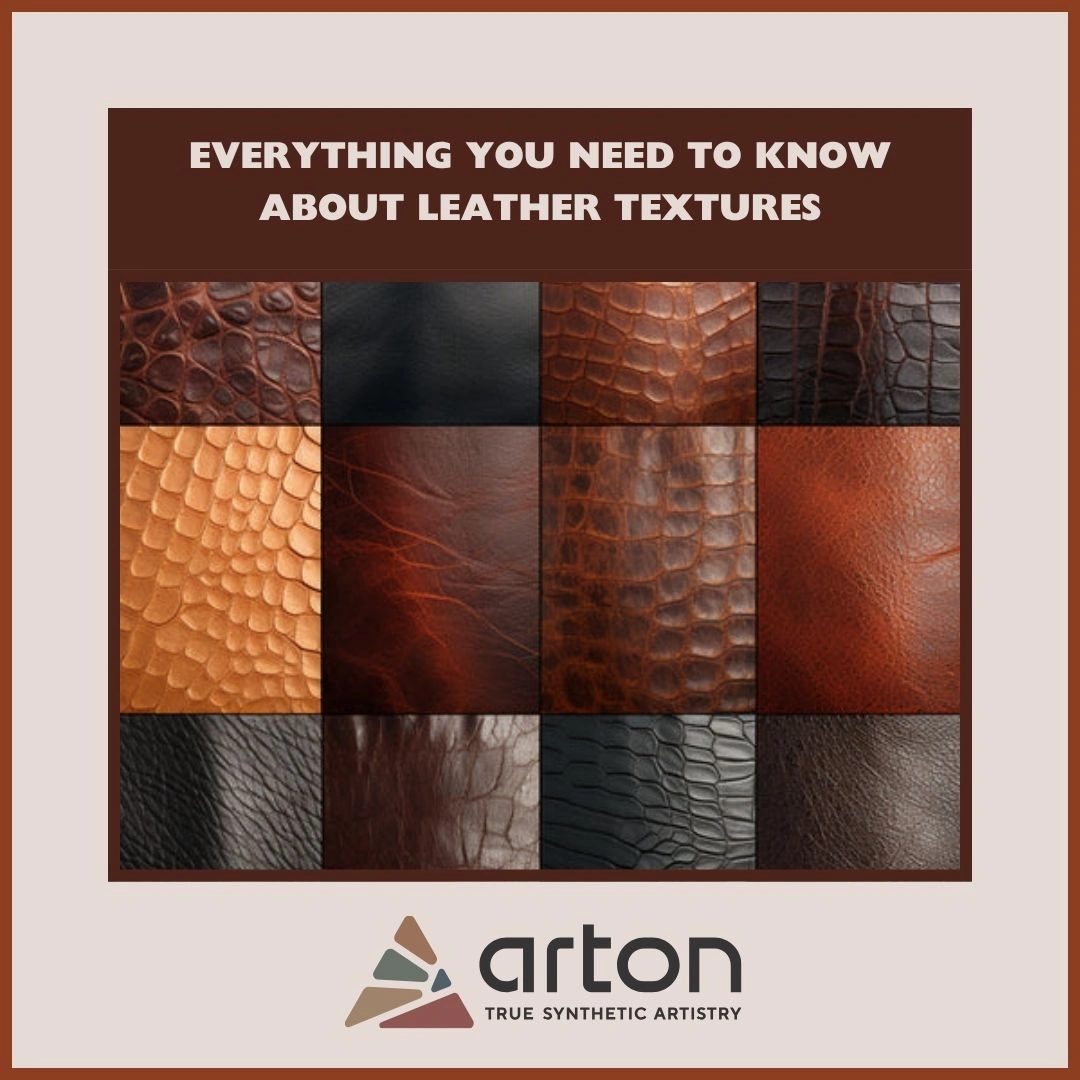07 June, 2025
Leather’s texture is one of its most defining features, shaping not only the look and feel of your favorite products but also their durability, breathability, and maintenance needs. If you plan to buy a new leather bag, jacket or leather upholstery, noticing the textures will help you select well and admire the quality of the leather.
What Is Leather Texture?
Leather texture is the appearance and feel of the outside part of a leather product. It can be as polished as smooth leather or as rough as well-textured grainy, pebbled, fuzzy or embossed leather. The texture depends on the piece of hide used, how it is processed and whether there are additional treatments.
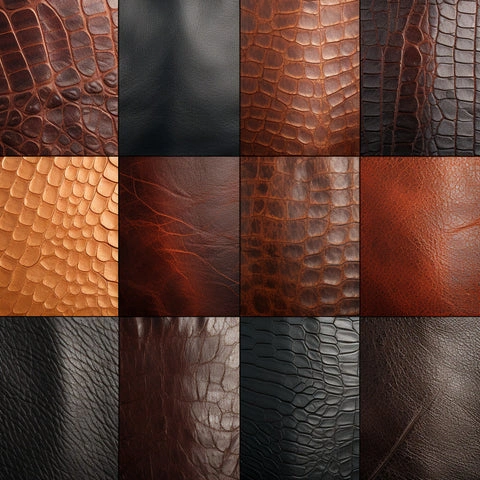
How Is Leather Texture Created?
Natural Grain: The Grain lines, present in top grain leather and full grain leather, make the hide look natural.
Tanning Methods: Vegetable-tanned leather may retain more natural texture, while chrome-tanned leather may be smoother.
Finishing Techniques: Applying buffing, embossing or sealing changes the way the leather appears.
Patina: With time, leather can develop a darker color and a new kind of texture.
Why Leather Texture Matters
Durability: If you choose pebbled or pull-up textured leather, it will be more durable.
Maintenance: Whether it’s smooth or grainy, leather tends to either highlight scratches or hide them.
Aesthetic: The style, feel and overall look of a product are determined by the texture.
Common Types of Leather Textures
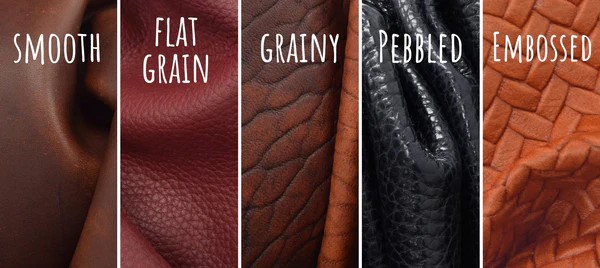
Understanding leather textures types helps you choose the right type for style, function, and durability. Here are the most popular types:
1. Smooth Leather
Smooth leather has a silky feel and very little texture. In general, it is crafted from full grain leather or top grain leather and is often incorporated into top-quality bags, shoes and leather furniture covers.
Feel: Soft, sleek, polished
Look: Uniform and elegant
Best for: Formal wear, luxury accessories
2. Pebbled Leather
With its raised surface, pebble leather strengthens the product and covers up scratches quite well. Embossing is used to create the pebbled effect when the product is made.
Feel: Textured, durable
Look: Dimpled and patterned
Best for: Everyday bags, wallets, belts
3. Flat Grain
Flat grain leather is noticeable for its grain and has a smooth texture. It mixes a classic sleek feel with the more complex grain of genuine leather.
Feel: Smooth, refined
Look: Natural grain with understated elegance
Best for: Accessories, upholstery, everyday fashion
4. Grainy Leather
The texture of the leather remains natural when it comes from grain leather. Full grain leather leaves all the natural flaws and features visible.
Feel: Slightly coarse, natural
Look: Organic, unprocessed
Best for: Premium leather goods, rugged accessories
5. Embossed Leather
It’s common to emboss leather with crocodile or snakeskin patterns to give the skin a unique appearance like that of genuine snake or crocodile leather but at a much lower price.
Feel: Varies by pattern
Look: Decorative and bold
Best for: Fashion items, statement pieces
Various other types of leather
In addition to the most commonly known textures, there are several other leather finishes and treatments that offer unique looks and applications. Here are a few more textures worth understanding:
1. Nubuck
Nubuck is formed by giving the outer side of the leather a light buff, making it feel like smooth suede but much more resilient. It appears neat and is smooth on the fingertips.
Feel: Smooth, suede-like
Look: Matte with slight texture
Best for: Footwear, high-end leather goods, accessories
2. Suede
Suede is crafted from the reverse side of the hide, unlike nubuck. The napped finish is soft on the skin but tends to pick up stains easily.
Feel: Soft, fuzzy
Look: Muted and natural
Best for: Casual shoes, jackets, interior decor
3. Pull-Up Leather
Leather that is treated with oil and wax becomes distressed and vintage looking whenever it is bent or shaped by pulling.
Feel: Waxy, rugged
Look: Weathered and unique
Best for: Boots, vintage-style bags, jackets
4. Buffered Leather
Buffered leather is smoothed by sanding and it is usually used as the foundation for treatments such as embossing.
Feel: Uniform, sleek
Look: Ready for pigment or finish
Best for: Fashion goods, leather sheets
5. Latigo Leather
This type of leather is created by uniting vegetable tanning and chrome tanning. Because it is powerful, flexible and water resistant, leather is often used to make saddles and outdoor equipment.
Feel: Firm yet pliable
Look: Semi-gloss with a dense grain
Best for: Belts, saddles, heavy-duty accessories
6. Pigmented Leather
This type of leather is coated with pigments and finishes as a surface layer. It makes the wood look smoother and stronger, yet the natural lines can no longer be clearly seen.
Feel: Coated, protective
Look: Smooth and even-colored
Best for: Furniture, automotive interiors, high-traffic areas
7. Hair Cell Texture
Hair cell texture makes leather look as if it had small indentations, like the natural pores found on genuine leather. Many times, this texture is applied to look like top-grain leather.
Feel: Textured, slightly raised dots
Look: Uniform and refined
Best for: Bags, wallets, and synthetic leather alternatives
Popular Leather Finishes
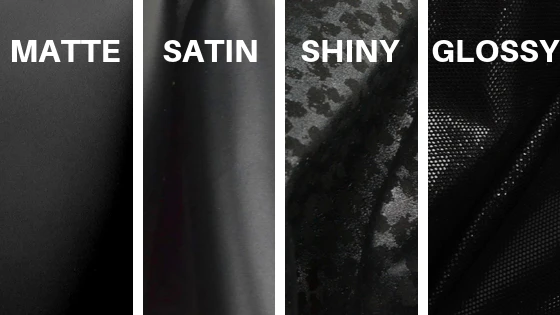
Natural: The original hide is preserved, allowing you to see the actual grain and spots on the hide.
Patent: Shiny, leather with a reflected, highly polished effect.
Matte: A soft, not-glossy finish that looks sleek and trendy on any finish.
Satin: A type of finish that is neither too shiny nor too flat.
Shiny: A light-reflecting finish that provides a bright and natural-looking effect.
Glossy: Has a high-quality, smooth and shiny surface.
Leather Appearance: What It Is and Why It Matters
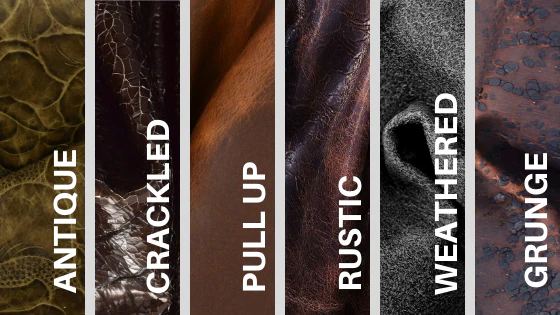
Antique / Distressed: This type of leather appears to be well-loved and aged, with patina, dark edges and a vintage style. Handmade leather items such as wallets, often get this in order to give them a rustic appearance.
Crackled: These leather items have cracks painted on the surface for aesthetic reasons. The surface scratches don’t damage the leather and are what give it a special vintage style.
Pull-up: Handling the Pull-up leather makes it shift which uncovers the lighter colors hidden beneath the waxes or oils. Over the years, it forms beautiful stretches and wrinkles that make it valuable.
Rustic: This look gives leather a “Western” or outdoor-appropriate style. Commonly, it is left with scratches, natural grain or different color tones, appearing rough and basic.
Weathered: The leather looks worn out, similar to distressed leather that has been weathered by the sun, rain or wind. Consider old, weathered designs that look as if nature has taken its course.
Grunge: Grunge leather is designed to showcase scrapes, bites from insects, branding and unmatched color. While before people dismissed this look as imperfect, it is now sought after for being uniquely authentic.
Choosing the Right Texture for Your Needs
For Luxury and Longevity: select full grain or pebbled leather for interior uses, like bags and shoes.
For Sleek Style: Choose leather that is smooth or in a flat grain style for a modern look.
For Unique Flair: Embossed leather or exquisite materials can finish things beautifully.
For Softness: If you want something soft, go for suede or nubuck, as they require special attention.
Choose Perfect Leather Textures
Final Thoughts
Understanding different kinds of leather and their textures empowers you to select products that match your style and performance needs.Whether you prefer the elegance of smooth leather, the rugged appeal of grainy finishes, or the artistic touch of embossed designs, each leather material tells a story — and with the best quality leather, that story only gets better over time.
Explore the wide range of faux leather textures available at Rock Uniquoters to bring your creative vision to life—sustainably and stylishly.

